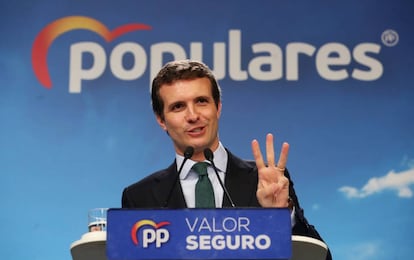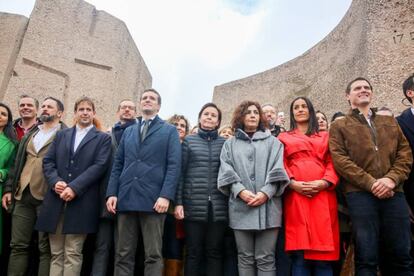After stinging election defeat, PP chief Pablo Casado does strategy U-turn
Despite months of making overtures to far-right party Vox, the conservative leader has now dismissed the group, with a new campaign aimed at reclaiming the center ground

The 2019 general election may be over, but Spain’s political parties are still in campaign mode. With just 25 days to go until the regional, municipal and European Union polls due to take place on May 26, the leader of the Popular Party (PP) is changing tack after the conservative group saw the worst result in its history at Sunday’s national vote.
After a conspicuous silence in the wake of securing just 66 seats in Congress – down from 137 at the 2016 elections – PP chief Pablo Casado did an about-turn on Tuesday, after his strategy of moving the party to the right – mostly in response to the emergence of far-right group Vox – had obviously failed. Speaking to the press, Casado referred to Vox as the “ultra-right,” and announced a new campaign slogan: “Centrados en tu futuro,” which could be translated as “focused on your future,” but in Spanish has a clear appeal to the center voter, whom the PP managed to lose in Sunday’s vote.
In Spain there is only one center-right party: the Popular Party
Popular Party leader Pablo Casado
Prior to speaking to the press, Casado – who took over as party chief in the wake of the successful no-confidence motion filed last year against then-PP Prime Minister Mariano Rajoy – had held a meeting of the party’s executive committee, at which the electoral fiasco was analyzed. During the three-hour encounter, party chiefs lamented the loss of the moderate supporter at the ballot box.
Where just last week, at the close of the election campaign, Casado was open to offering ministries to Vox, should they need to do a deal to form a government, on Tuesday he used the term “ultra-right” to refer to the party, and slammed its leader, Santiago Abascal, for having “taken money from foundations and gravy trains,” in reference to his time working for public entities in the Madrid region, where he was paid salaries of up to €80,000 a year.
He also went back on his own words on election night, which were echoed the day after by his mentor, former Spanish Prime Minister José María Aznar, that the party had lost because of the fragmentation of the right – voters could choose between the PP, center-right group Ciudadanos (Citizens) and Vox. On Tuesday, Casado stated that the responsibility for the poor results lay squarely with the party for not having convinced the electorate. “The voter, like the customer, is always right,” he said.
Casado has also made changes to the party’s organization in the wake of the general election. Javier Maroto, who was in charge of the campaign ahead of Sunday’s vote, will not be repeating his role for the May 26 elections. Instead, Cuca Gamarra – vice-secretary of Social Policies for the PP – and Isabel García Tejerina – vice-secretary of Social Projects – will be taking over the regional and local campaign and the European Union campaign, respectively.
They wanted to put us in government and now they are insulting us
Vox leader Santiago Abascal
The leader of the Asturian branch of the PP, Mercedes Fernández Cherines, explained that Casado had proposed these changes to the campaign team. “Maroto got more things wrong than right,” she added.
“It’s not true that there are three right-wings in Spain,” Casado told the press on Tuesday. “In Spain there is only one center-right party: the PP. There is a far-right party, Vox, and a social-democrat party, Ciudadanos, which is disguised as a liberal group. At most it is a center-left party. We are not interchangeable.”
His words were in marked contrast to the overtures that the PP has made toward Vox in recent months. Last December, an inconclusive election in the Andalusia region saw the party eventually form a government thanks to the support of Ciudadanos and Vox, the far-right group playing the role of kingmaker thanks to its surprise success in those polls, forcing out the Socialist Party from power for the first time in 36 years. And earlier this year, before elections were called, the leaders of the three parties – Casado, Albert Rivera (Ciudadanos) and Santiago Abascal (Vox) – posed together for photos at a protest organized in Madrid’s Colón square, aimed at forcing then-Prime Minister Pedro Sánchez to call elections. Now Casado is putting distance between himself and Abascal, describing support for Vox as “a pointless vote.”

Abascal was quick to respond to Casado’s U-turn yesterday, writing via his Twitter account: “They wanted to put us in government and now they are insulting us. [The Popular Party] is determined to self-destruct. Only they know who their enemy is. We will be the only opposition to the progressive dictatorship and the treasonous separatists. Vox is the future. Welcome to the resistance.”
Casado made clear on Tuesday that he was not planning on resigning, and nor would he do so should the results at the May elections be equally disappointing. The PP chief called for the time that his predecessors – such as Rajoy – had, “who won on the third try,” or Ciudadanos chief Rivera, “who has just lost his fourth elections.” “They have not been able to defeat us nor will they be able to,” he continued. “Neither with the dark arts nor with warped campaigns. We’re out to get them all. We need to rebuild the party, brick by brick, after these difficult months,” he said in conclusion.
English version by Simon Hunter.
Tu suscripción se está usando en otro dispositivo
¿Quieres añadir otro usuario a tu suscripción?
Si continúas leyendo en este dispositivo, no se podrá leer en el otro.
FlechaTu suscripción se está usando en otro dispositivo y solo puedes acceder a EL PAÍS desde un dispositivo a la vez.
Si quieres compartir tu cuenta, cambia tu suscripción a la modalidad Premium, así podrás añadir otro usuario. Cada uno accederá con su propia cuenta de email, lo que os permitirá personalizar vuestra experiencia en EL PAÍS.
¿Tienes una suscripción de empresa? Accede aquí para contratar más cuentas.
En el caso de no saber quién está usando tu cuenta, te recomendamos cambiar tu contraseña aquí.
Si decides continuar compartiendo tu cuenta, este mensaje se mostrará en tu dispositivo y en el de la otra persona que está usando tu cuenta de forma indefinida, afectando a tu experiencia de lectura. Puedes consultar aquí los términos y condiciones de la suscripción digital.








































